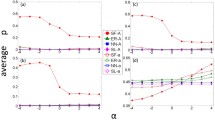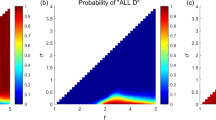Abstract
This paper introduces a stochastic strategy updating rule with preference in the public goods game. Besides, we also consider the carrying capacity of individual reproductive abilities and two different types of population sizes, the fluctuating and fixed sizes. Through systematic analyses, this paper explores the impact of the preference heterogeneity in the stochastic strategy update rule on the emergence and maintenance of cooperation. The results show that in both types of populations, the strategy updating rule can facilitate the evolution of cooperation by increasing the preference for cooperation, thereby alleviating the public goods dilemma. In addition, in a fixed-size population, when cooperation is a successful evolutionary strategy, increasing the preference for cooperation is beneficial to enhancing the maintenance of the cooperation. However, in a fluctuating-size finite population, reducing the preference for cooperation is beneficial to enhancing the stability of the cooperative evolutionary dynamics.





Similar content being viewed by others
Data availability
The datasets generated during and/or analyzed during the current study are available from the corresponding author on reasonable request.
References
Gross J, De Dreu CKW (2019) A study of human cooperation and its evolution. Sci Adv 5(4):eaau7296
Colman AM (2006) The puzzle of cooperation. Nature 440(7085):744–745
Schmidtz D, Willott E (2014) The tragedy of the commons. Island Press, Washington
Tucker AW, Luce RD (1950) Contributions to the theory of games. Princeton University Press, Princeton
Dugatkin LA, Perlin M, Lucas JS et al (2005) Group-beneficial traits, frequency-dependent selection and genotypic diversity: an antibiotic resistance paradigm. Proc Royal Soc B Biol Sci 272(1558):79–83
Hardin G (1968) The tragedy of the commons. Proc Inst Civ Eng-Eng Sustain 162(3859):1243–1248
Wang Q, He N, Chen X (2018) Replicator dynamics for public goods game with resource allocation in large populations. Appl Math Comput 328:162–170
Perc M, Jordan JJ, Rand DG et al (2017) Statistical physics of human cooperation. Phys Rep 687:1–51
Wang X (2021) Costly participation and the evolution of cooperation in the repeated public goods game. Dyn Games Appl 11:161–183
Nowak MA, Highfield R (2013) SuperCooperators: altruism, evolution, and why we need each other to succeed. Free Press, Washington
Olson M (1971) The logic of collective action: public goods and the theory of groups, second printing with a new preface and appendix. Harvard University Press, Cambridge
Nowak MA (2006) Five rules for the evolution of cooperation. Science 314(5805):1560–1563
Wang L, Jia D, Zhang L et al (2022) Lévy noise promotes cooperation in the prisoner’s dilemma game with reinforcement learning. Nonlinear Dyn 108:1837–1845
Su Q, McAvoy A, Mori Y et al (2022) Evolution of prosocial behaviours in multilayer population. Nat Hum Behav 6(3):338
Donahue K, Hauser OP, Nowak MA et al (2020) Evolving cooperation in multichannel games. Nat Commun 11(1):3885
Wang S, Chen X, Xiao Z et al (2023) Optimization of institutional incentives for cooperation in structured populations. J R Soc Interface 20:20220653
Gross J, De Dreu CKW, Reddmann L (2022) Shadow of conflict: How past conflict influences group cooperation and the use of punishment. Organ Behav Hum Decis Process 171:104152
Quan J, Chu YQ, Liu W et al (2019) Stochastic evolutionary public goods game with first and second order costly punishments in finite populations. Chin Phys B 27:060203
Sigmund K, Hauert C, Nowak MA (2001) Reward and punishment. Proc Natl Acad Sci USA 98(19):10757–10762
Szolnoki A, Perc M (2001) Reward and cooperation in the spatial public goods game. EPL 92(3):38003
Wang XW, Nie S, Jiang LL et al (2017) Role of delay-based reward in the spatial cooperation. Physica A 465:153–158
Wang X, Chen X, Gao J et al (2013) Reputation-based mutual selection rule promotes cooperation in spatial threshold public goods games. Chaos Solitons Fract 56(4):181–187
Gross J, De Dreu C (2019) The rise and fall of cooperation through reputation and group polarization. Nat Commun 10:776
Quan J, Nie J, Chen W et al (2022) Keeping or reversing social norms promote cooperation by enhancing indirect reciprocity. Chaos Solitons Fract 158:111986
Quan J, Cui S, Chen W et al (2023) Reputation-based probabilistic punishment on the evolution of cooperation in the spatial public goods game. Appl Math Comput 441:127703
Wang X, Chen W (2019) The evolution of cooperation in public good game with deposit. Chin Phys B 28(8):080201
Wang X, Chen W (2020) Evolutionary dynamics in spatial threshold public goods game with the asymmetric return rate mechanism. Chaos Solitons Fract 136:109819
Zhang J, Zhang C, Cao M (2015) How insurance affects altruistic provision in threshold public goods games. Sci Rep 5(1):9098
Wang X, Chen W (2020) Effects of attitudes on the evolution of cooperation on complex networks. J Stat Mech: Theory Exp 2020(6):063501
Gross J, De Dreu CKW, Veistola S et al (2020) Self-reliance crowds out group cooperation and increases wealth inequality. Nat Commun 11(1):5161
Nak MA, May RM (1992) Evolutionary games and spatial chaos. Nature 359(6398):826–829
Quan J, Tang C, Wang X (2021) Reputation-based discount effect in imitation on the evolution of cooperation in spatial public goods games. Physica A 563:125488
Ashcroft P, Altrock PM, Galla T (2014) Fixation in finite populations evolving in fluctuating environments. J R Soc Interface 11(100):942–949
Krebs CJ, Boutin S, Boonstra R et al (1995) Impact of food and predation on the snowshoe hare cycle. Science 269(5227):1112–1115
Rohani P, Earn DJD, Grenfell BT (1999) Opposite patterns of synchrony in sympatric disease metapopulations. Science 286(5441):968–971
Benincà E, Huisman J, Heerkloss R et al (2008) Chaos in a long-term experiment with a plankton community. Nature 451(7180):822–825
Melbinger A, Cremer J et al (2010) Evolutionary game theory in growing populations. Phys Rev Lett 105(17):178101
Constable GW, Rogers T, Mckane AJ et al (2016) Demographic noise can reverse the direction of deterministic selection. Proc Natl Acad Sci USA 113(32):201603693
Czuppon P, Traulsen A (2018) Fixation probabilities in populations under demographic fluctuations. J Math Biol 77(4):1233–1277
Constable GWA, Rogers T, McKane AJ et al (2016) Demographic noise can reverse the direction of deterministic selection. Proc Natl Acad Sci USA 113(32):4745–4754
McAvoy A, Fraiman N, Hauert C et al (2018) Public goods games in populations with fluctuating size. Theor Popul Biol 121:72–84
Hauert C, Holmes M, Doebeli M (2006) Evolutionary games and population dynamics: maintenance of cooperation in public goods games. Proc Royal Soc B Biol Sci 273(1605):3131–3132
Behar H, Brenner N, Ariel G et al (2016) Fluctuations-induced coexistence in public goods dynamics. Phys Biol 13(5):056006
Chen X, Liu Y, Zhou Y et al (2012) Adaptive and bounded investment returns promote cooperation in spatial public goods games. PLoS ONE 7(5):e36895
Beck JH (1994) An experimental test of preferences for the distribution of income and individual risk aversion. East Econ J 20(2):131–145
Cowell FA, Schokkaert E (2001) Risk perceptions and distributional judgments. Eur Econ Rev 45:941–952
Fehr E, Schmidt KM (1999) A theory of fairness, competition and cooperation. Quart J Econ 114:817–868
Chambers CP (2012) Inequality aversion and risk attitudes. J Econ Theor 147(4):1642–1651
Harrison GW (1986) An experimental test for risk aversion. Econ Lett 21(1):7–11
Imhof LA, Nowak MA (2006) Evolutionary game dynamics in a wright-fisher process. J Math Biol 52(5):667–681
Funding
This research was supported by the National Natural Science Foundation of China (No. 72031009, 72371193) and Chinese National Funding of Social Sciences (No. 20&ZD058).
Author information
Authors and Affiliations
Contributions
WC and JQ analyzed the results and wrote the manuscript. XW developed the model.
Corresponding author
Ethics declarations
Conflict of interest
The authors declare that they have no known competing financial interests or personal relationships that could have appeared to influence the work reported in this paper.
Ethical Approval
There are no ethics concerns.
Additional information
Publisher's Note
Springer Nature remains neutral with regard to jurisdictional claims in published maps and institutional affiliations.
Rights and permissions
Springer Nature or its licensor (e.g. a society or other partner) holds exclusive rights to this article under a publishing agreement with the author(s) or other rightsholder(s); author self-archiving of the accepted manuscript version of this article is solely governed by the terms of such publishing agreement and applicable law.
About this article
Cite this article
Chen, W., Quan, J. & Wang, X. The emergence and maintenance of cooperation in the public goods game under stochastic strategy updating rule with preference. Dyn Games Appl (2023). https://doi.org/10.1007/s13235-023-00548-1
Accepted:
Published:
DOI: https://doi.org/10.1007/s13235-023-00548-1




